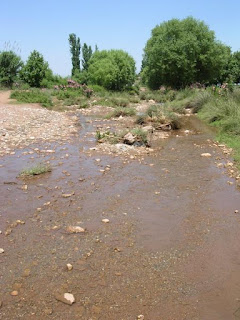On to Act II of Mary Shelley's play about King Midas.
As we will
see in Act II.
Midas is
partying as the curtain rises. He’s so impressed with his new power to create
gold with a mere touch (I’d sell all my gold stocks, by the way (not that I
have any): supply and demand, you know?); he believes, in fact, that he rivals
the gods. Great Jove, he cries, / Transcends me but by lightning….[1]
I’ve learned
a few certainties in life, and this is one of them: You don’t declare yourself
the equal of the gods, most of whom have no sense of humor. Then tend to send
out a quick reminder that you are manifestly not their equal. Check out the story of Bellerophon, who, as you
recall, thought he’d ride Pegasus to the summit of Mt. Olympus, maybe have a
latte with Zeus? (Didn’t work out. Didn’t get even a tall decaf.) Think, too,
of poor Icarus …
Midas is a
little slow to catch on that things are not going to work out. His servants and
attendants complain: All their garments are now gold and are, well, heavy. He doesn’t care.
But soon he
does. Whenever he tries to eat or drink, the food and liquid immediately turn
to gold, which, as I’m sure you know, is a little difficult to chew. And
digest.
Uh oh.
He quickly
sends his advisors to Bacchus to make some sort of sacrifice that will remove
the “blessing.” Bacchus—probably smiling—assents, and all Midas has to do is
bathe in the stream at Pactolus. Easy enough. But then he has to throw all the
Midas-minted gold into the stream, as well.
Midas
eagerly complies. And cries out: Look at
the grass, the sky, the trees, the flowers, / These are Jove’s treasures and
they are not gold. He goes on in this, uh, vein for a while, then ends the
play with these words about how he has shed himself of Man’s curse, heart-bartering, soul-enchaining gold.[2]
As I said
above, Mary certainly learned this story from her father—probably from his lips
and certainly from his book about mythology for young readers, The Pantheon (1805). In that account,
Godwin chides Midas for his grasping
and foolish spirit.[3]
Godwin mentions the same river—but notes only that Midas had to bathe in it
(nothing about tossing away all his goodies), and he adds this tidbit: … and from that time the Pactolus became
distinguished from all other rivers by rolling over sands of gold.[4]
(The
Pactolus, by the way, is a wee river (sixteen miles in length) in Turkey, and,
via Google, you can easily find photographs and further information about its
history.)


No comments:
Post a Comment